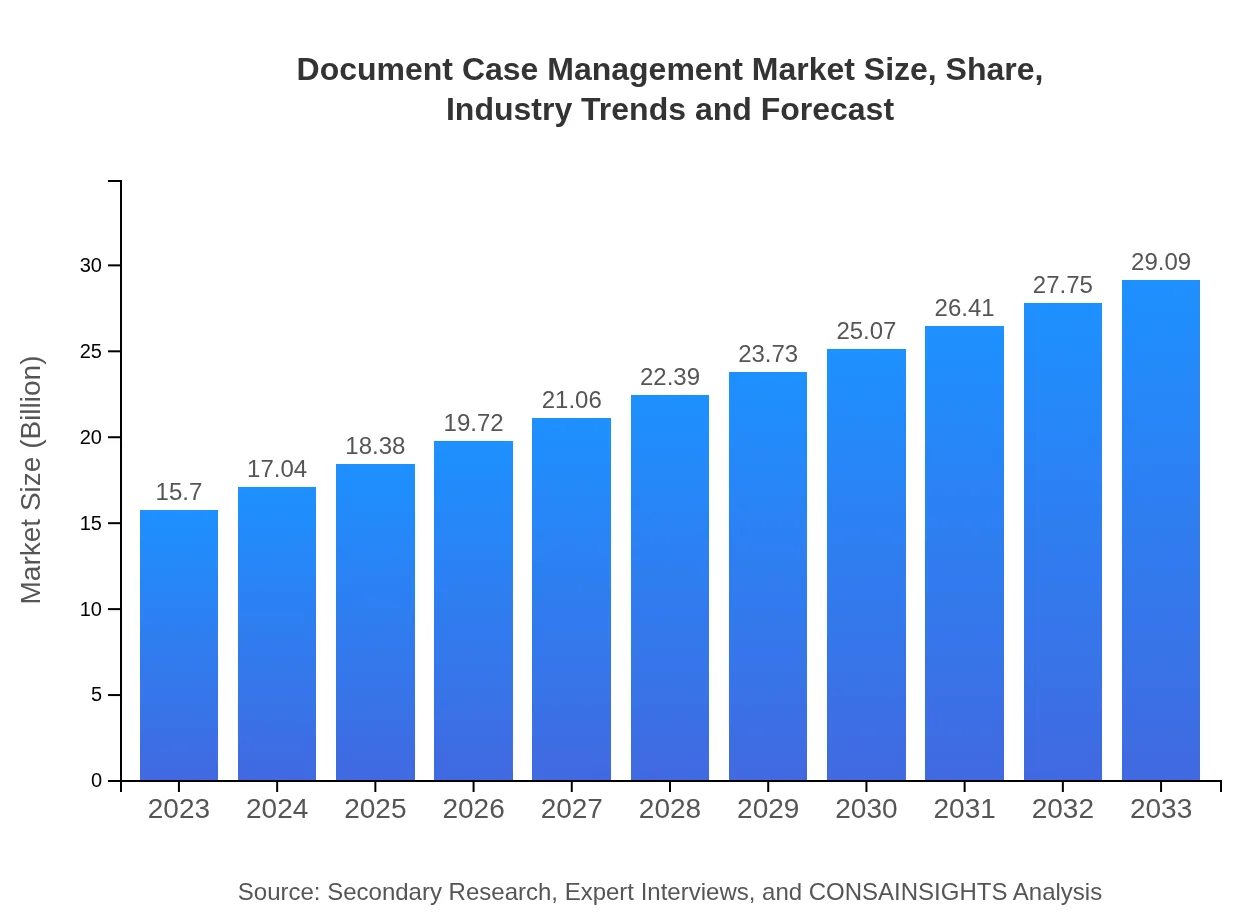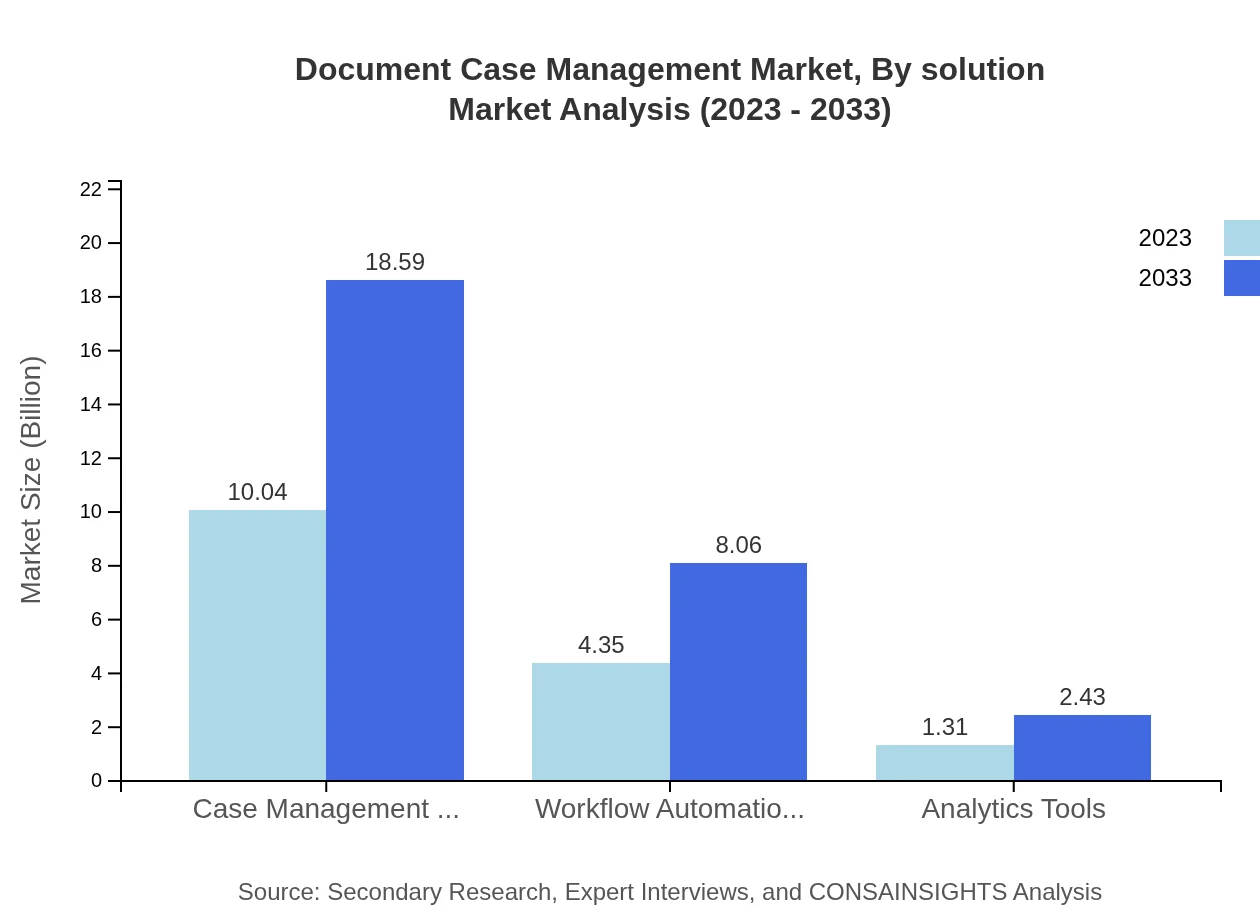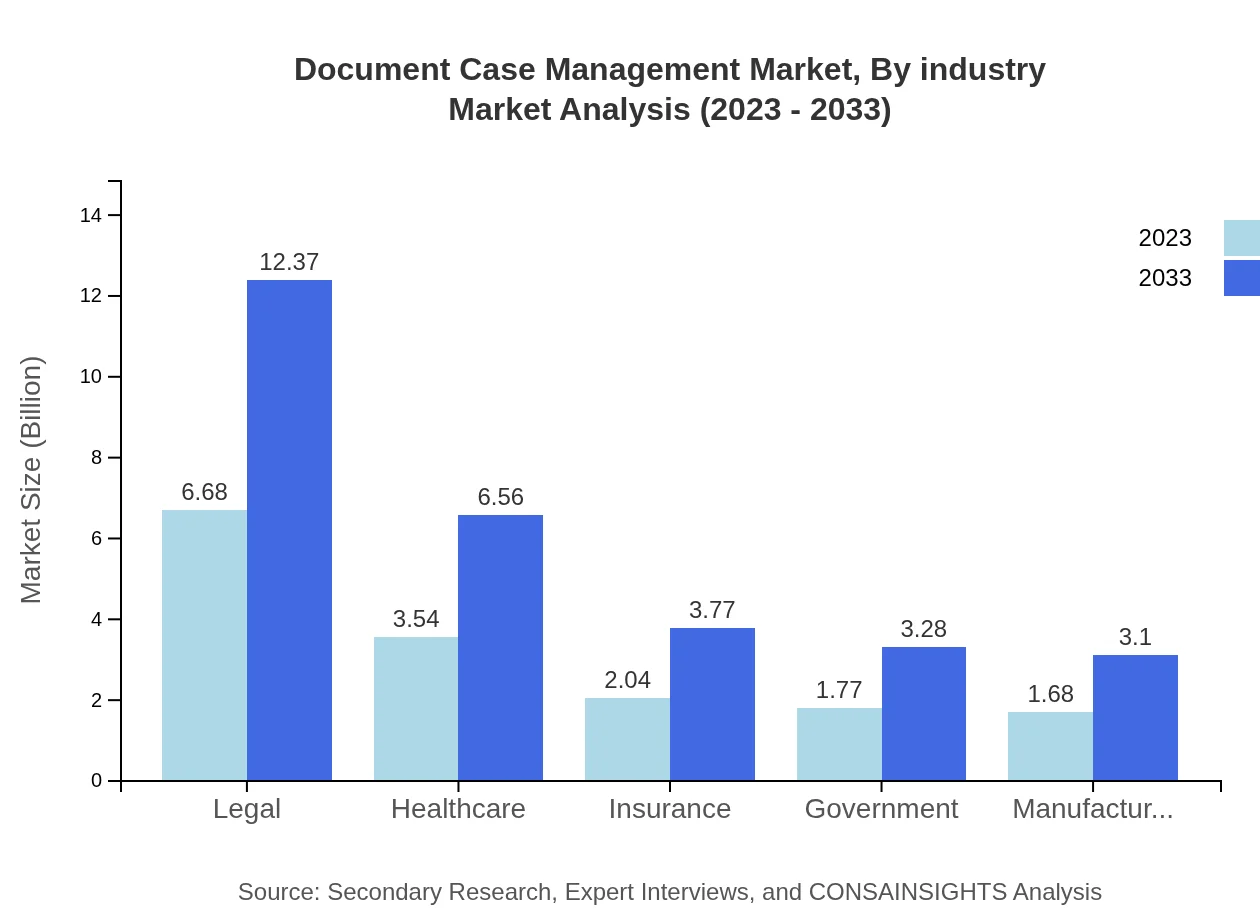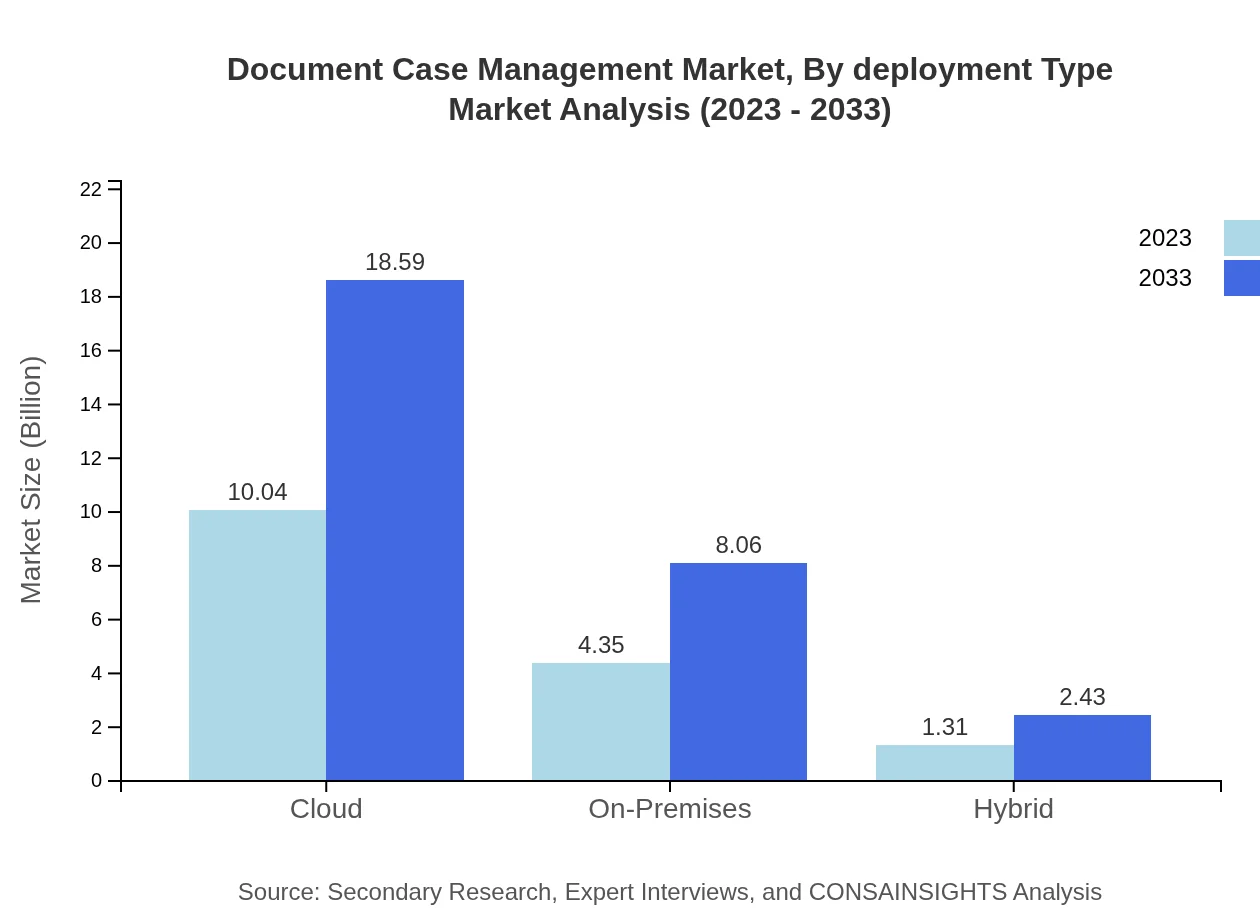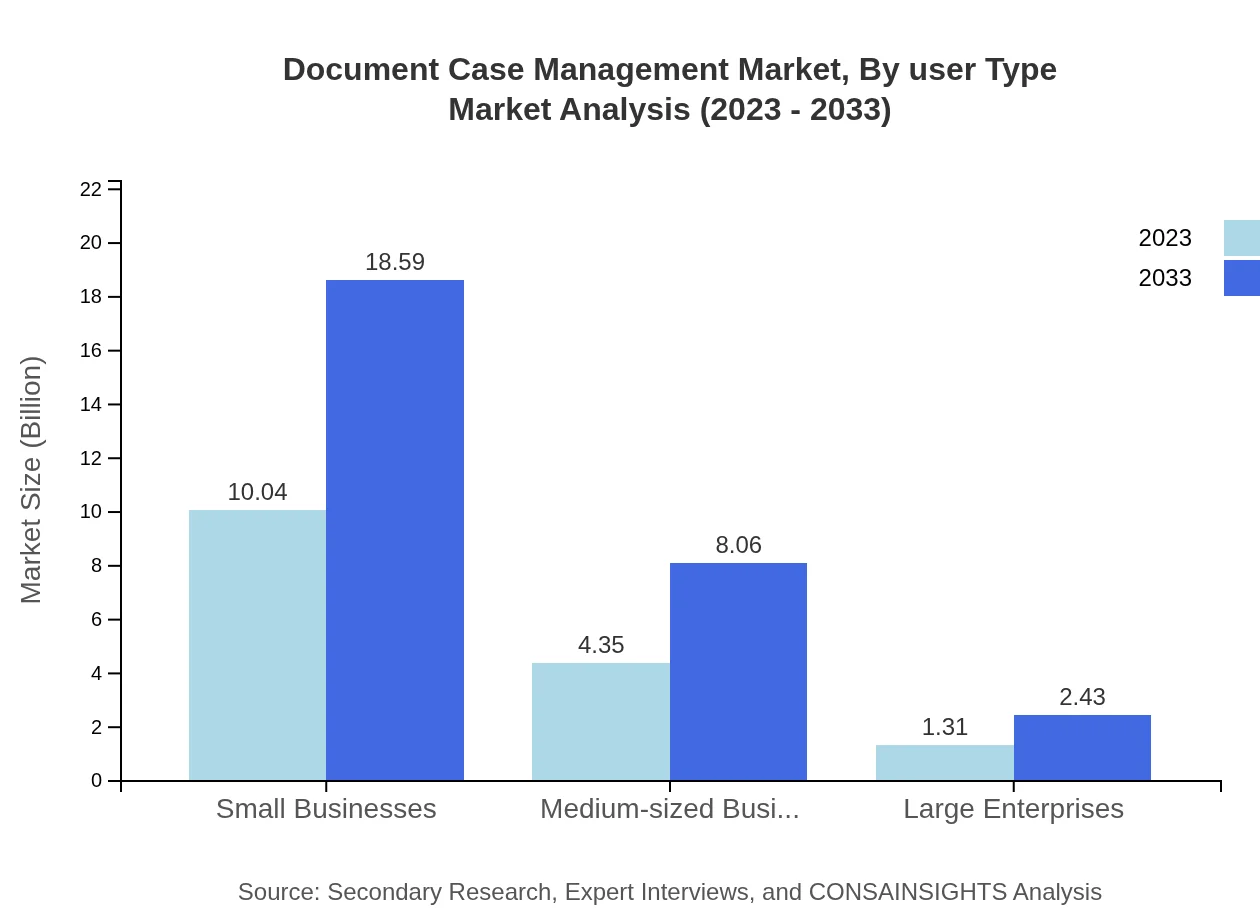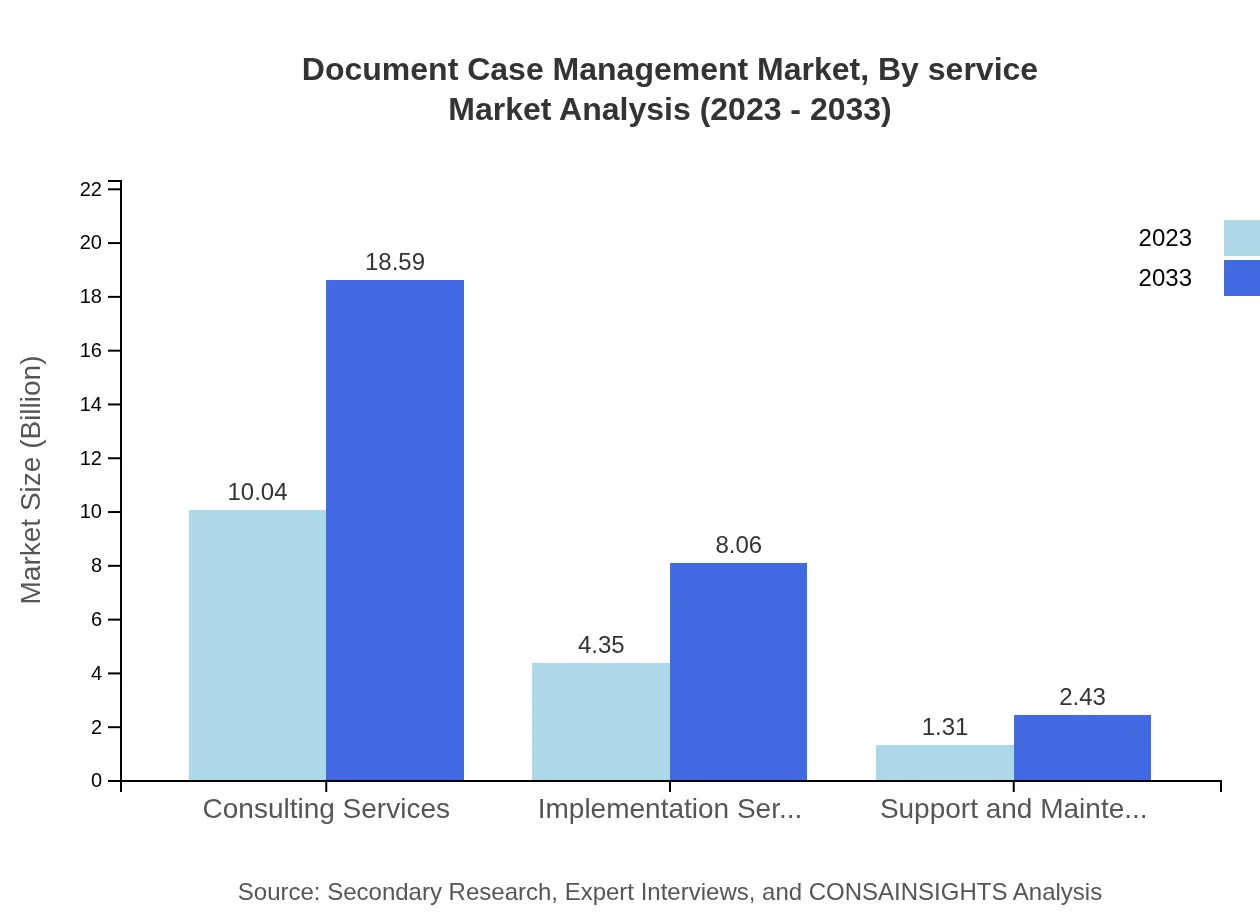Document Case Management Market Report
Published Date: 31 January 2026 | Report Code: document-case-management
Document Case Management Market Size, Share, Industry Trends and Forecast to 2033
This report provides an in-depth analysis of the Document Case Management market from 2023 to 2033, offering insights into market trends, size, segmentation, and regional dynamics to support strategic decision-making.
| Metric | Value |
|---|---|
| Study Period | 2023 - 2033 |
| 2023 Market Size | $15.70 Billion |
| CAGR (2023-2033) | 6.2% |
| 2033 Market Size | $29.09 Billion |
| Top Companies | M-Files, OpenText, DocuWare, Box, IBM |
| Last Modified Date | 31 January 2026 |
Document Case Management Market Overview
Customize Document Case Management Market Report market research report
- ✔ Get in-depth analysis of Document Case Management market size, growth, and forecasts.
- ✔ Understand Document Case Management's regional dynamics and industry-specific trends.
- ✔ Identify potential applications, end-user demand, and growth segments in Document Case Management
What is the Market Size & CAGR of Document Case Management market in 2023?
Document Case Management Industry Analysis
Document Case Management Market Segmentation and Scope
Tell us your focus area and get a customized research report.
Document Case Management Market Analysis Report by Region
Europe Document Case Management Market Report:
The European market is slated to increase from $4.50 billion in 2023 to approximately $8.33 billion by 2033. Factors contributing to this growth include stringent data regulations, an emphasis on secure and efficient document processes, and the ongoing digital transformation across major industries.Asia Pacific Document Case Management Market Report:
The Asia Pacific region shows significant potential, with a projected market size of $6.02 billion by 2033, up from $3.25 billion in 2023. Rapid digitalization, coupled with the growth of SMEs, drives demand for Document Case Management solutions. Countries like China, India, and Japan lead in adoption due to increased R&D investments in IT infrastructure.North America Document Case Management Market Report:
North America holds one of the largest shares of the Document Case Management market, valued at $5.54 billion in 2023 and projected to reach $10.27 billion by 2033. The region's dominance is attributed to high investments in technology and significant demand in industries such as legal, healthcare, and finance.South America Document Case Management Market Report:
In South America, the market is expected to grow from $1.13 billion in 2023 to $2.09 billion by 2033. The region's growth is fueled by a burgeoning middle class and increasing digital adoption, despite economic challenges. Countries such as Brazil and Argentina are investing heavily in technological solutions for enhanced document handling.Middle East & Africa Document Case Management Market Report:
The Middle East and Africa region shows promising growth, with market size expected to grow from $1.28 billion in 2023 to $2.38 billion by 2033. The increase is driven by ongoing investments in digital infrastructure and rising demand for efficient document management solutions to enhance operational efficiency.Tell us your focus area and get a customized research report.
Document Case Management Market Analysis By Solution
In 2023, the consulting services segment leads the Document Case Management market with a value of $10.04 billion, projected to grow to $18.59 billion by 2033, holding 63.92% market share. Implementation services follow, starting at $4.35 billion with an expected growth to $8.06 billion, representing 27.71% of the market share. Support and maintenance services, though smaller, show significant growth from $1.31 billion to $2.43 billion, catering to the essential need for ongoing support in document management.
Document Case Management Market Analysis By Industry
Legal and healthcare sectors are major industries contributing to Document Case Management, starting at $6.68 billion and $3.54 billion in 2023, respectively. By 2033, their values are predicted to reach $12.37 billion and $6.56 billion, capturing shares of 42.54% and 22.54%. Government and insurance also play essential roles, emphasizing adherence to compliance and efficient document management.
Document Case Management Market Analysis By Deployment Type
Cloud solutions dominate the deployment type segment, valued at $10.04 billion in 2023 and expecting it to double to $18.59 billion by 2033, retaining 63.92% of the market. On-premises solutions stand strong as well, set to grow from $4.35 billion to $8.06 billion, while hybrid models offer flexibility, rising from $1.31 billion to $2.43 billion.
Document Case Management Market Analysis By User Type
Small businesses display the largest demand for Document Case Management, beginning at $10.04 billion in 2023 with expected growth to $18.59 billion. Medium-sized businesses follow suit, starting from $4.35 billion, while large enterprises show a valuable but smaller segment valued at $1.31 billion, reflecting different needs for document solutions across sizes.
Document Case Management Market Analysis By Service
The services segment includes consulting, implementation, and ongoing support and maintenance. Consulting leads with significant revenue, while support remains essential, particularly for industries that require stringent compliance adherence. The overall service sector within the market is projected to grow substantially as companies find value in comprehensive document management strategies.
Document Case Management Market Trends and Future Forecast
Tell us your focus area and get a customized research report.
Global Market Leaders and Top Companies in Document Case Management Industry
M-Files:
M-Files offers a unique metadata-driven approach to document management, aiding businesses in meeting compliance and operational efficiency objectives through intelligent information management.OpenText:
OpenText is a leader in enterprise information management, providing comprehensive document management solutions that streamline workflows and improve productivity across industries.DocuWare:
DocuWare specializes in cloud document management and workflow automation, serving organizations of all sizes to optimize their document processes.Box:
Box provides a cloud-based platform that combines content management and collaboration tools, making it a favored choice for many enterprises to manage and access documents securely.IBM:
IBM offers advanced document management solutions through its Watson platform, leveraging AI to enhance document processing and management efficiency.We're grateful to work with incredible clients.









FAQs
What is the market size of document Case Management?
The global Document Case Management market was valued at approximately $15.7 billion in 2023, with a projected CAGR of 6.2%, expected to reach substantial growth by 2033.
What are the key market players or companies in the document Case Management industry?
Key players in the Document Case Management industry include major software developers and IT consulting firms that provide tailored solutions for effective case management and document handling across various sectors.
What are the primary factors driving the growth in the document Case Management industry?
Growth in the Document Case Management industry is attributed to increasing digital transformation across businesses, rising demand for efficient document handling, regulatory compliance, and the adoption of cloud-based solutions.
Which region is the fastest Growing in the document Case Management?
North America is currently the fastest-growing region in the Document Case Management market, with a growth from $5.54 billion in 2023 to $10.27 billion by 2033, followed closely by Europe and the Asia Pacific region.
Does ConsaInsights provide customized market report data for the document Case Management industry?
Yes, ConsaInsights offers customized market report data tailored to specific requirements in the Document Case Management industry, providing actionable insights and detailed analysis.
What deliverables can I expect from this document Case Management market research project?
Deliverables from the Document Case Management market research project typically include comprehensive reports, market segmentation analysis, growth forecasts, and strategic recommendations tailored to your business needs.
What are the market trends of document Case Management?
Key trends in the Document Case Management market include the shift towards cloud services, increased automation in document processing, and growing investments in AI-driven case management solutions.

